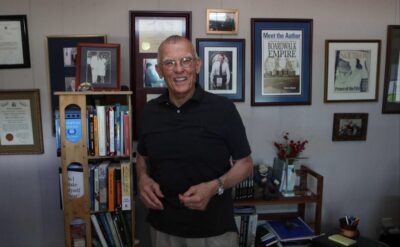John Oakes: The Fast: The History, Science, Philosophy, and Promise of Doing Without
March 2, 2024 by David
Filed under Non-Fiction, WritersCast
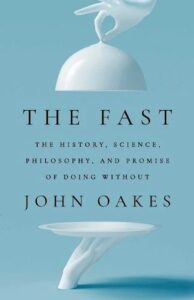 The Fast: The History, Science, Philosophy, and Promise of Doing Without—John Oakes—Avid Reader Press / Simon & Schuster—Hardcover —9781668017418—320 pages—$30—February 13, 2024—ebook versions available at lower prices
The Fast: The History, Science, Philosophy, and Promise of Doing Without—John Oakes—Avid Reader Press / Simon & Schuster—Hardcover —9781668017418—320 pages—$30—February 13, 2024—ebook versions available at lower prices
If you’re expecting to find a “how to guide to fasting” you will have to look elsewhere. John Oakes is far too good a writer and thinker to spend his time writing something simple like a guide book or even a “rah rah” tome aimed at encouraging you to take up the idea of “intermittent fasting” for yourselves. You might decide to try it out after reading The Fast, but that’s not his purpose and not why you should want to read this book. If you are already engaged in fasting, you should read this book. Perhaps it will be most especially useful during the meditative moments while you are in the midst of your own fast.
Oakes is more interested in a deeper approach to this practice, giving it historicity and enabling us to explore for ourselves how denial of a core bodily function can alter consciousness and help us better understand ourselves. This kind of antidote to the habits of modern life does have an appeal to many of us, but even if you are not going to be a practitioner, you will find yourself captivated, as he is, by the science, history, philosophy and spiritual background of fasting and the denial of physical needs. For Oakes, the ideas and the connection to human spirituality are as important as the specific practices themselves. I’m glad of that, as it makes reading this book that much more rewarding to engage with.
I will also note that Oakes, who has been an editor and publisher for many years, is a really terrific writer and therefore you can read this book for the pleasure good writing affords. As I am sure many of you who listen to this podcast have noticed, there are a lot of badly written books out there and no one wants to spend their limited time reading them. Given the vast number of choices of what to read, it is a particular joy to discover a really good writer. Bravo Oakes for spending a lifetime learning how to write, and bravo Avid Reader Press for publishing this book. I hope you will consider reading it yourself after you listen to our conversation here. Whether you decide to fast or not. For myself, much as I like this book, I am happier eating than not, even if it is an indication of my generally shallow approach to spirituality.
I’ve known John Oakes for a number of years through our mutual involvement in independent publishing. He is currently the publisher of The Evergreen Review. He is also editor-at-large for OR Books, which he cofounded in 2009. OR has been a singularly contrarian publisher for many years, built to demonstrate an alternative approach to traditional reliance on a certain popular online bookseller. Oakes has written for a variety of publications and The Fast is his first book.
We had alot of fun talking together about John’s book. Enjoy…
Podcast: Play in new window | Download
S.C. Gwynne: His Majesty’s Airship interview by David Wilk
August 28, 2023 by David
Filed under Non-Fiction, WritersCast
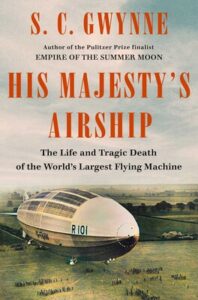 His Majesty’s Airship: The Life and Tragic Death of the World’s Largest Flying Machine — Sam Gwynne — Scribner — 9781982168278 — 320 pages — hardcover — $32.00 – May 2, 2023 — ebook versions available at lower cost
His Majesty’s Airship: The Life and Tragic Death of the World’s Largest Flying Machine — Sam Gwynne — Scribner — 9781982168278 — 320 pages — hardcover — $32.00 – May 2, 2023 — ebook versions available at lower cost
Sam Gwynne is the author of the outstanding Empire of the Summer Moon, a book I really loved. In this new work, he tells the story of a very different sort, documenting the British airship R101, but covering essentially the entire rise and fall of “lighter than air” powered flight. Like so many other airships, R101 crashed horribly in 1930 and killed almost its entire crew, including the leadership of the British airship industry, which at the time still hoped for an empire conquering means of travel. It was a massive case of a foolish, hubristic belief in something that could never succeed. It’s tempting to view this disaster as symptomatic of an empire in decline.
At least for a time, airships were a symbol of the future. R101 was, in fact, the largest aircraft ever to have flown and the product of what appeared to be advanced engineering. Somehow its supporters simply failed to recognize that these massive, hydrogen fueled, uncontrollable flying structures were bound to fail.
There is a captivating cast of characters at hand, including German inventors, well-to-do aristocrats to brilliantly flawed engineers, alcoholic flyers and even a Romanian princess and her doomed romance with the leader of the British airship program.
Gwynne is a masterful storyteller and is able to bring a previously obscure piece of twentieth century history to life for modern readers. It was a pleasure to speak with him about this book, his working methods as a writer of history, and a range of other topics as well. I’m looking forward to reading Sam’s next book, on any subject he cares to write about. He is that good a writer.
S.C. “Sam” Gwynne is the author of acclaimed books on American history: Empire of the Summer Moon and Rebel Yell: The Violence, Passion, and Redemption of Stonewall Jackson, Hymns of the Republic: The Story of the Final Year of the American Civil War, and The Perfect Pass: American Genius and the Reinvention of Football. He grew up in Connecticut, went to Princeton and Johns Hopkins, and now lives in Austin, Texas.
Sam has written for Texas Monthly and for Outside magazine. He was a Correspondent, Bureau Chief, National Correspondent and Senior Editor for Time Magazine and has also written for the New York Times, Harper’s, Los Angeles Times, San Francisco Chronicle, California Magazine, Boston Globe, Dallas Morning News, and other publications.
Buy the book from Bookshop.org
“Aviation history is nothing less than miraculous; it took a mere sixty-three years, after all, to get from the Wright brothers to Neil Armstrong. Barely a century ago, however, our skies were filled with a bounty of gliders, biplanes, and flying boats; balloons, blimps, and zeppelins. With His Majesty’s Airship, the inimitable Mr. Gwynne explores in vivid detail how this dream bloomed, and how it, in time, fell tragically to earth. He has written both a remarkable history and an eye-opening revelation of technology’s recurrent phantasms.” — Craig Nelson, award-winning author of Pearl Harbor and Rocket Men
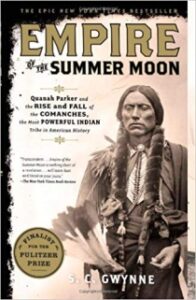
Podcast: Play in new window | Download
Cornelia Maude Spelman: Missing: A Memoir
October 25, 2022 by David
Filed under Non-Fiction, WritersCast
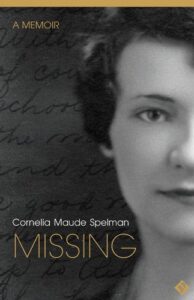 Missing: A Memoir – Cornelia Maude Spelman – Jackleg Press – 9781737513445 – Paperback – 176 pages – $17.00 – July 15, 2022 – ebook versions available at lower prices
Missing: A Memoir – Cornelia Maude Spelman – Jackleg Press – 9781737513445 – Paperback – 176 pages – $17.00 – July 15, 2022 – ebook versions available at lower prices
Cornelia Maude Spelman is best known as a children’s book author. This memoir of her family was spurred by her meeting with and friendship with the late New Yorker editor William Maxwell (himself an extraordinary writer as well), who knew her parents in the 1920s when they were at the University of Illinois together.
Cornelia plainly admired and enjoyed the company of Maxwell, but also was fascinated that he knew her parents before they had children, before their lives went in different directions than Maxwell’s. At one of her meetings with him, she suggests that her parents’ lives were not successful in the terms they had hoped for. Maxwell gently tells her that “in a good novel one doesn’t look for a success story, but for a story that moves one with its human drama and richness of experience.”
It was Maxwell who prompted Cornelia to explore and tell the story of her parents. This memoir tells that story. Spelman spent years exploring the history of her family. It’s a wonderful exploration, full of side trips and thoughtful reflections, and much that anyone interested in the mysteries of their family members will appreciate. Superman was luckier than most of us, in that she was able to meet with people who knew her parents when they were young. Most of us get interested in these stories far too late in our own lives to be able to talk to people who actually knew our older family members, or who, if still around, can remember anything meaningful to tell us.
Spelman’s research is extensive too. She goes to Iowa and Illinois to track down places and information details of her family history and to find people who know something about her parents and their parents. She recounts letters and interviews, even finding medical records and telegrams to help fill out stories that would otherwise be invisible or lost. Importantly Spelman is able to reconstructs her mother’s life and death, as well as that of her long lost brother. Cornelia’s writing is excellent and her storytelling compelling, so that even though we are not connected to the people about whom she writes, we can feel how she feels about them and about herself as she searches out and tells these “missing” family stories.
Cornelia is always honest with us about her disappointments, as well as what she learns that brings her joy and closure as well. This book is warm, profound, and honest. At the end, we know there is still much that will always be missing, but so much more that has been found.
Cornelia Maude Spelman, MSW, was a family therapist before she became a writer and artist. She’s written eleven books for children that help them manage emotions and difficult life situations. Her The Way I Feel series of books for young children has sold several million copies and been translated into Chinese, Korean, Spanish, Greek, Japanese, German, Arabic, Turkish, Danish, and Russian. Cornelia has earned awards from the Illinois Arts Council and was awarded the Bernard De Voto Fellowship in Nonfiction at Bread Loaf Writers’ Conference. This is her first book for adult readers.
It was truly a pleasure to speak with her about this book and her journey to write it.
Podcast: Play in new window | Download
Robert Child: Immortal Valor: The Black Medal of Honor Recipients of World War II
May 26, 2022 by David
Filed under Non-Fiction, WritersCast
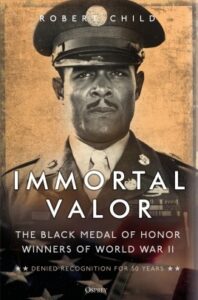 Immortal Valor: The Black Medal of Honor Recipients of World War II – Robert Child – Osprey – 9781472852854 – 288 pages – hardcover – $30 – January 11, 2022 – ebook edition available at lower prices
Immortal Valor: The Black Medal of Honor Recipients of World War II – Robert Child – Osprey – 9781472852854 – 288 pages – hardcover – $30 – January 11, 2022 – ebook edition available at lower prices
It is remarkable to realize how few medals of honor were awarded for service during World War II – there were 432 Congressional medals given out of the over sixteen million men and women who served during that four year period during which America fought large scale brutal wars in both the Pacific and European theaters. It is therefore shocking to find out that not a single African American was among the 432 honorees, despite the fact that over one million African Americans served in the then mostly segregated military environment.
Racism remains an American fact of life. But the “progress” made in the modern era probably has muddied our awareness of what our country was like such a short time ago. Robert Child has done an admirable service with this book, documenting the incredible heroism of the seven Black American heroes of World War II who were finally recognized for their efforts – but only after an incredibly long period of time and much work in their behalf.
Child documents the recent historical investigations that have discovered and the stories of extraordinary acts of heroism and valor by the Black soldiers in World War II who were eventually awarded the highest honor our country offers for wartime service. The group of servicemen includes Vernon Baker, Sergeant Reuben Rivers, and Lieutenant Charles Thomas, who led his platoon that captured a strategically important village in Germany in 1944 despite suffering grievous wounds and losing half the men in his unit. The other four who are portrayed sympathetically and thoroughly in this book are Willy James, Jr., John Fox, Edward A. Carter, Jr., and George Watson, heroes all, not only for their valor in the fights they undertook, but for what they did to overcome the deep-seated endemic racism in the military during the time they served their country.
It was not until 1993 that a US Army commission determined that these seven men had been denied our country’s highest award – only because of racial discrimination. And then it was in 1997, more than 50 years after the war that President Clinton finally awarded the Medal of Honor to them, with only one still being living at the time.
Their stories comprise most of this book, as well as some background about the military before, during and after World War II. Sadly, it is almost certain that there are other Black service men and women who might have deserved recognition for their sacrifices and heroism in that war. It was not even until the Obama administration that two World War I heroes were recognized, Sergeant William Shemin, for whom the anti-semitism of the time meant his amazing feats of heroism were almost lost to history, and Sergeant William Henry Johnson, another Black soldier who had been recognized by France with a Croix de Guerre in 1919, but neglected by the United States for far too long.
It was an honor for me to speak with author Robert Child about this terrific and highly emotional book.
Child is a military history writer, director, and author with. Robert has received writing and directing awards including an Emmy® nomination. He lives in Atlanta.
“This is the only comprehensive narrative written about the African American Medal of Honor recipients of WWII to date. Extremely well written, with very little personal background on some of these men to work with, Child manages to bring each of these heroes’ stories to life on a personal level. Child carefully reconstructs each recipient’s life prior to his act of valor, demonstrating the character traits that made each an example of integrity, sacrifice and courage. This is a must-read book about seven black soldiers and their bravery at the highest level and the racial injustice that took over four decades to acknowledge. Well done!” ―Arthur Collins, President, 5th Platoon, the black World War II education and reenactment group
Podcast: Play in new window | Download
Nelson Johnson: Darrow’s Nightmare-The Forgotten Story of America’s Most Famous Trial Lawyer
July 12, 2021 by David
Filed under Non-Fiction, WritersCast
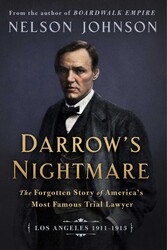 Darrow’s Nightmare: The Forgotten Story of America’s Most Famous Trial Lawyer (Los Angeles 1911–1913) – Nelson Johnson – 9781948122733 – 360 pages – April 20, 2021 – Hardcover – Rosetta Books – ebook editions available at lower prices
Darrow’s Nightmare: The Forgotten Story of America’s Most Famous Trial Lawyer (Los Angeles 1911–1913) – Nelson Johnson – 9781948122733 – 360 pages – April 20, 2021 – Hardcover – Rosetta Books – ebook editions available at lower prices
One of the great personal joys that working in the book business enables is that I get to work with authors. I’ve done some consulting with Rosetta Books, the publisher of Darrow’s Nightmare, and through the publisher have had the opportunity to meet and get to know former New Jersey judge Nelson Johnson, who turns out to be a terrific person, as well as a wonderful storyteller, historian, and writer.
I had known of Nelson Johnson mainly because his earlier best-selling book, Boardwalk Empire, became the basis of the excellent HBO series of the same name. Boardwalk Empire documents the tumultuous story of the Atlantic City in the early twentieth century, a time when racketeers and corrupt politicians ran the city. Boardwalk Empire is a terrific book with incredibly interesting characters and clearly, Nelson Johnson knows how to write history that conveys characters and their stories dramatically for readers.
In Darrow’s Nightmare, Nelson turns his attention to Clarence Darrow, one of the greatest trial attorneys in modern American history, in one of the most tumultuous and challenging episodes of his long career. Best known today for his role in the famous Scopes trial of 1925 (and the film, Inherit the Wind), Darrow was actually most famous in his earlier years as a brilliant defender of labor rights, at a time when organized labor was literally battling with business owners across the country for basic freedoms and policies we take for granted today.
In 1911, Darrow went to Los Angeles with his wife, Ruby, at the behest of union leaders there. He was to defend two union iron workers who had been charged with the murder of twenty employees of the Los Angeles Times, whose building had been bombed as part of a major labor dispute.
After he negotiated a plea bargain for the iron workers (with the help of Lincoln Steffens), Darrow himself was indicted for attempted bribery of a juror in the trial. Darrow was fortunate to be represented by the brilliant (though flawed) California criminal attorney Earl Rogers, who was himself one of the most successful trial attorneys in American history and with the help of Rogers and friendly juries, Darrow was able to escape being convicted in two different trials. He returned to Chicago in disgrace, set himself to rebuilding his career, and went on to take on some of what are now the most famous trials of his era, including the Leopold and Loeb case and the important civil rights Sweet case in Detroit, where he defended the right of a black family to self-defense. Looking over the arc of Darrow’s long legal career, the LA trials of 1911-1913 form the most crucial episode of his life.
These trials made national news at the time, but have been mostly lost to history now. Nelson has brought the entire scene to life in memorable prose. He may be one of the few who have read the entire 8,500 page trial transcript. It is quite a story and well worth reading. And Nelson tells the story behind the story in the podcast episode presented here, which I very much enjoyed recording.
Darrow captured the imagination of many Americans in his time in history. I think that reading Darrow’s Nightmare, you might be captured as well, and see him as a flawed hero, a human being much more complex than any film could portray.
“The marks of battle are all over his face” —H.L. Mencken
“A fascinating portrait of Clarence Darrow as we’ve never seen him before—as a criminal defendant. In Darrow’s Nightmare, Nelson Johnson tells the riveting tale of America’s most famous lawyer as he fights for his life, marriage, career, and reputation. I couldn’t put it down.” —Terence Winter, Creator & Executive Producer, Boardwalk Empire
Nelson C. Johnson practiced law for 31 years prior to being appointed to the New Jersey Superior Court. During his final five years on the bench, he was one of three judges in New Jersey assigned to litigation, involving product liability claims. In the early 1980s Nelson represented the Atlantic City Planning Board when the modern casino period was beginning. That experience motivated him to write Boardwalk Empire. He has written two other books about New Jersey history. During the past 15 years, Nelson has made more than 200 presentations on his books before a wide range of audiences.
He lives in Hammonton, New Jersey.
Buy the book here from Bookshop.org. Visit the author’s website here.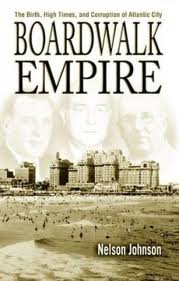
Podcast: Play in new window | Download
Christina Thompson: Sea People: The Puzzle of Polynesia
January 14, 2020 by David
Filed under Non-Fiction, WritersCast
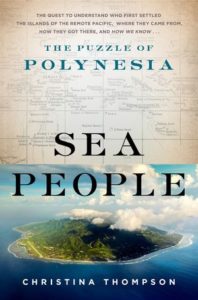 Sea People: The Puzzle of Polynesia – Christina Thompson – 9780062060877 – Harper – Hardcover – 384 pages – $29.99 – March 12, 2019 – ebook editions also available at lower prices, varying by outlet.
Sea People: The Puzzle of Polynesia – Christina Thompson – 9780062060877 – Harper – Hardcover – 384 pages – $29.99 – March 12, 2019 – ebook editions also available at lower prices, varying by outlet.
“I loved this book. I found Sea People the most intelligent, empathic, engaging, wide-ranging, informative, and authoritative treatment of Polynesian mysteries that I have ever read. Christina Thompson’s gorgeous writing arises from a deep well of research and succeeds in conjuring a lost world.”
– Dava Sobel, bestselling author of Longitude and The Glass Universe
I completely agree with Dava Sobel. This is an incredible book, probably the best introduction to the ancient and modern world of the Polynesian people of the Pacific islands you could ever read. She starts with an anecdote of modern Polynesia that aptly sets the scene for the entire story. Thompson is married to a Maori (her first book, Come on Shore and We Will Kill and Eat You, tells the history of the Maori people of New Zealand, who are among the many groups of Polynesians). When she and her husband are in Hawaii about to rent a kayak, the Hawaiian managing the concession tells them it rents for “thirty dollars….but twenty for you, brother.” It’s a striking moment, giving Thompson the opportunity to explain the entire outline and genesis of the book. Polynesians all over the Pacific from New Zealand to Hawaii to the Easter Islands are related to one another. They all instantly recognize the cultural connection, and while many of the lifeways and life skills that existed hundreds or a thousand years ago have disappeared, and European and Asian influences have spread throughout the region, the ocean environment is what it always was. The mystery is, of course, how did the Polynesians navigate the open ocean for over 1000 years to populate the vast majority of the Pacific Ocean? Sea People tells that story brilliantly.
Through the course of this deftly written book, Thompson tells us how the earliest identifiable Polynesians settled this vast region. She explores what was once called the “Problem of Polynesian Origins” that fascinated the thinking of many European scientists during the late nineteenth century and into the modern era, where a variety of theories have competed to explain who the Polynesians are and how they got there (from the east or from the west, for example.)
This book is a comprehensive telling of history, geography, anthropology, and includes a great deal about the science of navigation. It’s a completely engrossing and riveting read, making it one of the more satisfying nonfiction books I have read in a long time.
Christina is a great person to talk to, so knowledgeable and comfortable with her material and never dry or pedantic in her approach to communicating so much of what she knows. It was a pleasure to speak with her for Writerscast.
My interview with Christina Thompson about her (wonderful) previous book, Come on Shore and We Will Kill and Eat You All can be found here on Writerscast, (originally posted in December, 2011.)
Christina’s author website is here.
The book is available for purchase from independent bookseller RJ Julia here.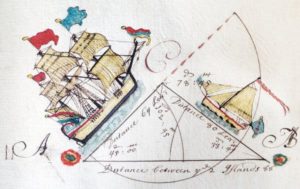
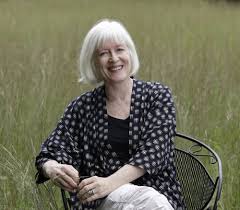
Podcast: Play in new window | Download
Joseph Kelly: Marooned: Jamestown, Shipwreck, and a New History of America’s Origin
March 18, 2019 by David
Filed under Non-Fiction, WritersCast
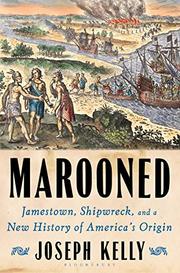 Marooned: Jamestown, Shipwreck, and a New History of America’s Origin – Jospeh Kelly – 978-1-63286-777-3 – Bloomsbury – Hardcover – 512 pages – $32 – October 30, 2018 – ebook versions available at lower prices
Marooned: Jamestown, Shipwreck, and a New History of America’s Origin – Jospeh Kelly – 978-1-63286-777-3 – Bloomsbury – Hardcover – 512 pages – $32 – October 30, 2018 – ebook versions available at lower prices
I really enjoy reading books about American history, and especially lately, books that explore some of the stories and moments that are foundational to the history of this continent, but are not well known or well told. And I’ve also become extremely concerned about gaining a better and more nuanced understanding of those stories that have been told solely from the perspective of the European (white) perspective that dominates our historical narrative, and thus our understanding of ourselves.
Joseph Kelly’s Marooned is just such a book, and I was immediately drawn to it. This is an insightful re-examination of the 1607 Jamestown settlement, the story of which really should replace the Mayflower colony’s position as America’s founding Puritan-centric myth.
In fact, the multiple stories of Europeans’ initial contact with the native peoples who fully inhabited North, Central and South America all require a complete re-examination, and I have been reading several books that provide insight into the way these continents were conquered by the marauding Europeans and their violence and diseases.
Marooned is about much more than just the Jamestown settlement. The book begins by recounting the settlement’s really awful circumstances. Most of those early settlers died of disease or starvation or deserted to the local tribes for protection. The workings of the Virginia Company that was set up to colonize and exploit the supposedly “virgin” New World are fascinating and in some ways depressingly familiar to our modern large scale version of unrestrained capitalism.
The traditional blame for the miseries of Jamestown’s early years goes to those leaders who failed to manage their “lazy” colonists, as opposed to those who were ready, willing and able to literally whip them into shape. But Kelly makes it clear that because it was the aristocrats who wrote the documents on which our traditional history relies, the real story may be, likely is, significantly different. Kelly finds ample evidence that the colonists who were cast into the wilderness, “marooned” from home and trying to survive, experienced a far different reality than their leaders. Many of them had a nascent understanding that Britain’s rigid class structure would not work in this different environment, and that their actual survival required a far more equitable system of governance. In fact, there were many uprisings and expressions of rebellion, all of which were put down, although a limited electoral oligarchy emerged during the course of the 17th century in the Virginia colony.
There are many side trips and journeys throughout this engaging narrative. The story of the castaways from one of the resupply ships on Bermuda, truly a story of being marooned, is striking. Nine ships en route to re-supply Jamestown in 1609 were hit hard by a hurricane, a storm of extreme high winds and waves, and one ship, the Sea Adventure, with some of the key leaders of the expedition on board, was wrecked on the shores of the Bermudas. The crew reached one of the islands in safety, and almost a year later, after building two boats by hand, they sailed again for Jamestown, and somewhat surprisingly, were able to reach their destination not long after departing from Bermuda. This story circulated widely in London, and may well have inspired Shakespeare’s great play, The Tempest. The timing is certainly right for that to be the case.
Kelly contributes a significantly better understanding of the Powhatan Confederacy’s formation and politics before and during the settlement period, as well as the fluidity between the cultures of the native peoples and the colonists. Marooned is not just the story of the Europeans and their conquest, but successfully weaves together the the narrative of the struggles of native peoples of that time and place in their powerful efforts to survive the arrival of the brutal land grabbing English settlers and the lives of the colonists at the lower ends of the social strata, whose stories we rarely, if ever, get to know.
It is a pleasure to discover such a good writer and story teller as Joe Kelly is. In this book, he truly brings history alive through its people, and with a narrative built on a solid grounding of research and a deeper understanding of the complexities of perspective than many other historians.
Joseph Kelly holds a Ph.D. in English from the University of Texas, Austin, and is a professor of literature and director of Irish and Irish American Studies at the College of Charleston. He is the author of America’s Longest Siege: Charleston, Slavery, and the Slow March Toward Civil War, and the editor of the Seagull Reader series. He lives in Charleston, South Carolina. Joe’s blog can be found here.
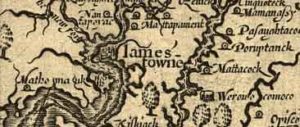
Podcast: Play in new window | Download
Bram Presser: The Book of Dirt (a novel)
January 8, 2019 by David
Filed under Fiction, WritersCast
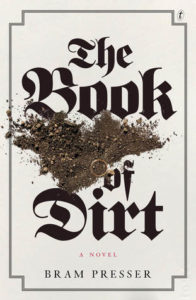 The Book of Dirt – Bram Presser – Text Publishing Company (Australia) – Paperback – 9781925240269 – 325 pages – $15.95 – September 11, 2018 – ebook versions available at lower prices
The Book of Dirt – Bram Presser – Text Publishing Company (Australia) – Paperback – 9781925240269 – 325 pages – $15.95 – September 11, 2018 – ebook versions available at lower prices
Personal and family history for most contemporary Jews is frequently fraught. Most of us have relatives who disappeared without a trace, except for scattered entries in German records of extermination. Some fewer of us have had living relatives whose lives were entwined with and defined by the Holocaust, almost always in horrific and devastating ways.
Bram Presser, an Australian punk rocker and practicing attorney who also happens to be a brilliant writer, spent eight years working on this novel, The Book of Dirt. It is a fabulous story that explores the real life story of Presser’s grandfather, Jakub Rand, from the 1920s onward through the Holocaust and beyond. Presser addresses history in all its complexity with the only tool that could possibly make sense of it – imagination.
Presser starts with family stories and personal legends, combined with archival research and interviews to create this novel. Of course it becomes partly fact, partly fiction. Some is memory and much is imagined.
The relatively large number of characters and the movement between places can be confusing for the reader, but Bram Presser’s grandfather, Jakub Rand, and his grandmother, Dasa Roubicek, and their immediate family are the focus of the book, and their story of survival shines through. The pain and suffering was immense and the power of humanity was as well.
You do not need to be Jewish to find this novel compelling and real. All of us can share through this novel what it means to find hope, and for the descendants of survivors of terror and loss to try to understand the stories of their forebears. This is a wonderful and transformative literary work.
The Book of Dirt has won a number of well-deserved awards in Australia. Bram Presser was born in Melbourne in 1976. He has been a punk rocker, an academic and a criminal attorney. He writes the blog Bait For Bookworms and is a founding member of Melbourne Jewish Book Week. His stories have appeared in Vice Magazine, The Sleepers Almanac, Best Australian Stories, Award Winning Australian Writing and Higher Arc. In 2011, Bram won The Age Short Story Award. Presser’s own website is very active and includes a great deal of material related to the stories behind The Book of Dirt; it is worthwhile to explore.
‘Meet Bram Presser, aged five, smoking a cigarette with his grandmother in Prague. Meet Jakub Rand, one of the Jews chosen to assemble the Nazi’s Museum of the Extinct Race. Such details, like lightning flashes, illuminate this audacious work about the author’s search for the grandfather he loved but hardly knew. Working in the wake of writers like Modiano and Safran Foer, Presser brilliantly shows how fresh facts can derail old truths, how fiction can amplify memory. A smart and tender meditation on who we become when we attempt to survive survival.’
Mireille Juchau
I hope you enjoy listening to Bram Presser talk about The Book of Dirt, a book I strongly recommend you seek out and read.
Podcast: Play in new window | Download
Ken Krimstein: The Three Escapes of Hannah Arendt
November 28, 2018 by David
Filed under Graphic Novels, Non-Fiction, WritersCast
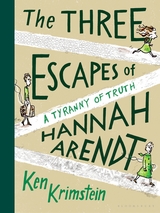 The Three Escapes of Hannah Arendt: A Tyranny of Truth – Ken Krimstein – Bloomsbury – 240 pages – Hardcover – 9781635571882 – $28.00 – September 25, 2018 – ebook versions also available at lower prices.
The Three Escapes of Hannah Arendt: A Tyranny of Truth – Ken Krimstein – Bloomsbury – 240 pages – Hardcover – 9781635571882 – $28.00 – September 25, 2018 – ebook versions also available at lower prices.
What a completely cool and unexpected pleasure it was to discover this amazing book! Yes, I had seen Ken Krimstein’s cartoons in the New Yorker, and I have even read a bit of Hannah Arendt’s powerful writing over the years, but neither Ken’s humorous work, nor my limited knowledge of Arendt’s life prepared me for the serial delight of this graphic novel biography of one of the twentieth century’s most important thinkers.
Hannah Arendt is one of those intellectual figures whose reputation obscures her actual story. Her books were highly influential and widely read in the mid and late twentieth century, though I suspect in present times, now are consumed mostly by college students and scholars, as serious political philosophy does not have a broad readership anymore (if it ever did). We know of her mainly through her many famous books, including The Human Condition, On Totalitarianism, and Eichmann in Jerusalem, among her many, many others.
Arendt’s writing on the nature and form of authoritarianism, couched in her direct experience with Hitler’s Germany, and the rise of Stalin after the war, certainly has become increasingly resonant today, for obvious reasons. And with the increase in modern day anti-Semitism, it is difficult to not draw comparisons between the 1930s world she inhabited and our current troubled experiences.
So it is timely to think about Hannah Arendt’s work, and especially to learn how that work was shaped by her extraordinary life and mind. As revealed in this wonderful biography, Hannah Arendt’s story is heroic and rich. The details about her life continually surprise and delight us. The men and women she knew are some of the greatest thinkers and artists of the century, and it is remarkable just how many now-famous people appear in her life. She knew and associated with so many,from philosophers like Heidegger and Jaspers, to political theorists like Walter Benjamin, writers like Mary McCarthy and geniuses like Albert Einstein and Sigmund Freud, and her own writing and thinking have influenced generations of thinkers and writers.
The escapes Krimstein documents so heart wrenchingly in this book were all determinative to the development of her thinking and writing, and shaped her individualistic, powerful thinking about what it means to be an engaged citizen in a modern world in constant strife. Reading this book was inspiring, and I give full credit to Ken Krimstein for bringing Hannah Arendt to life for me in a way I doubt a prose biography could have done.
Ken Krimstein’s cartoons have been published in the New Yorker, Barron’s, The Harvard Business Review, Prospect Magazine, Punch, The National Lampoon, the Wall Street Journal, Narrative Magazine and many others magazines. His writing has been published in The New York Observer’s “New Yorker’s Diary” and a number of humor websites, including McSweeney’s Internet Tendency, Yankee Pot Roast, and Mr. Beller’s Neighborhood.
Ken is also a teacher at De Paul University and The School of the Art Institute of Chicago. You can read more about him, his work, and The Three Escapes at his website here, where you can also see sample pages from the book.
It was a pleasure for me to meet Ken, and I think you will enjoy our conversation just as much as I did.
“Ken Krimstein’s deeply moving graphic memoir about the life and thoughts of philosopher Hannah Arendt is not only about Hannah Arendt. It’s also, through her words, about how to live in the world, the meaning of freedom, the perils of totalitarianism, and our power as human beings to think about things and not just act blindly. Krimstein explains Arendt’s ideas with clarity, wit, and enormous erudition, and they still resonate.” – Roz Chast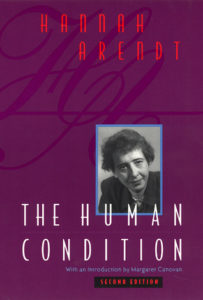

Podcast: Play in new window | Download
Nancy MacLean: Democracy in Chains: The Deep History of the Radical Right’s Stealth Plan for America
September 26, 2017 by David
Filed under Non-Fiction, WritersCast
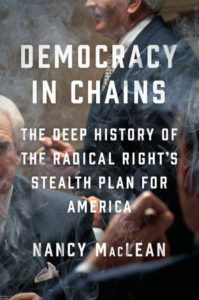 Democracy in Chains: The Deep History of the Radical Right’s Stealth Plan for America – Nancy MacLean – Viking – Hardcover – 9781101980965 – $28.00 – 368 pages – June 13, 2017
Democracy in Chains: The Deep History of the Radical Right’s Stealth Plan for America – Nancy MacLean – Viking – Hardcover – 9781101980965 – $28.00 – 368 pages – June 13, 2017
I will say this clearly and forthrightly: whatever your political opinions or positions, you must read this book. It shines an important light on the history of what has now become the most potent force in modern American politics. This book reveals in detail how the Koch brothers and other shadowy billionaires’ political philosophy has been weaponized in an ongoing war against democratic beliefs and institutions.
Professor MacLean came across this historical record more or less by accident, while she was researching the Nobel Prize-winning political economist, James McGill Buchanan, the principal architect of the ideas and institutions the Koch brothers and their allies have harnessed to radically alter the American political landscape in their distorted image of “economic libertarianism.” This philosophy fully recognizes that anti-democratic efforts are necessary to secure the wealth of the few against the “predations” of the democratic majority, and all their work for the last forty years or more has been aimed toward controlling and weakening democratic institutions. They have been remarkably successful in their efforts.
There is so much to learn in this book, yet still so much more for us to uncover, and ultimately then, so much that needs to be done by those who feel the need to defend democratic liberalism and American institutions. It is remarkable to learn that this effort is essentially part of a longstanding effort to reach far back into our history to undo FDR’s democratic reforms, as well as those of JFK, LBJ, and the civil rights movement. And that Charles Koch is so ironically a follower of the principles of that old Bolshevik, V.I. Lenin.
We learn here that Koch and his cronies have built a secret cadre of true believers who want to do what their hero Buchanan did in Pinochet’s Chile, which was to use the institutions of government to control and contain democracy. They have come a long way toward succeeding in our own country, as most citizens are completely unaware of what they are doing, especially with their takeover of the judiciary. And in Trump’s America, they are free to have their way with us.
One way you can tell Nancy MacLean has made an impact with her research is the level and sheer ferocity of mostly personal attacks from the right against her. Those who post in opposition seem to have neither read the book, nor care to think about the author’s actual work. One of the tools used by the Koch-financed opponents of democracy is the personal attack and what they call the “increased transaction cost” for anyone who opposes their views. Since they usually cannot win intellectual or even political arguments, they prefer to disparage and attack those who dare stand against them on other grounds than reason.
I urge listeners to read this book, think about what MacLean has uncovered, and then, if you agree with what she says, use what you learn from this book to stand up for freedom and democracy against oligarchy.
“This sixty-year campaign to make libertarianism mainstream and eventually take the government itself is at the heart of Democracy in Chains. . . . [MacLean] takes the time to meticulously trace how we got here. . . . If you’re worried about what all this means for America’s future, you should be. . . . And if someone you know isn’t convinced, you have just the book to hand them.”
—NPR
“It’s the missing chapter: a key to understanding the politics of the past half century. To read Nancy MacLean’s new book, Democracy in Chains: The Deep History of the Radical Right’s Stealth Plan for America, is to see what was previously invisible.”
—George Monbiot, The Guardian
“[A] riveting, unsettling account of ‘Tennessee country boy’ James McGill Buchanan, key architect of today’s radical right.”
—O, The Oprah Magazine
Nancy MacLean is also the author of Behind the Mask of Chivalry (a New York Times “noteworthy” book of the year) and Freedom is Not Enough. She is currently the William Chafe Professor of History and Public Policy at Duke University, and lives in Durham, North Carolina.
Podcast: Play in new window | Download



